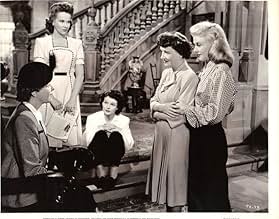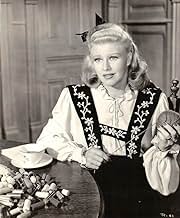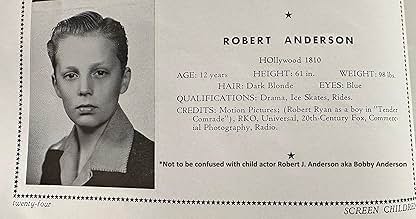Jo Jones, a young defense plant worker whose husband is in the military during World War II, shares a house with three other women in the same situation.Jo Jones, a young defense plant worker whose husband is in the military during World War II, shares a house with three other women in the same situation.Jo Jones, a young defense plant worker whose husband is in the military during World War II, shares a house with three other women in the same situation.
- Awards
- 4 wins total
- Chris Jones as a boy
- (uncredited)
- Western Union Girl
- (uncredited)
- Minor Role
- (uncredited)
- Boy
- (uncredited)
- Minor Role
- (uncredited)
- Doctor
- (uncredited)
- Mrs. Flanagan - Jo's Mother
- (uncredited)
- Waldo Pierson
- (uncredited)
- Baby
- (uncredited)
- Boy
- (uncredited)
- Director
- Writer
- All cast & crew
- Production, box office & more at IMDbPro
Featured reviews
In fact, in "Tender Comrade," Trumbo presents us with a puzzle: How could a writer responsible for so much hokey, amateurish dialogue (noted by other reviewers) ever get a reputation as being a great or even a good writer? I admit there were two bright spots in "Tender Comrade" that deserve appreciation for the writer: near the beginning, when two strangers comfort each other as their loved ones depart for the war, and when one character tells another how her marriage "proposal" came about.
Trumbo, though, being Trumbo later has a silly bit when Jo refers to the socialist plan the group adopts ("from each according to her ability ") as "democracy," further demonstrating his confusing of two different and distinct applications as the same.
"Democracy" is a more or less political term describing how leaders are chosen (if, for some reason, anyone wants leaders), and "socialism" is a more or less economic term and more or less philosophical term describing how material goods are more or less shared distributed, anyway. ("Socialism" means government ownership of the means of production, to be more pedantic.) There was nothing wrong with the democratically decided idea of voluntary communalism among the housemates, but if a viewer knows Trumbo's predilection for collectivism at least for others, though not so much for himself the whole scene is discomfiting.
(An excellent book that portrays Trumbo and others, and shows the dichotomy between what they preached, including sometimes in their scripts, and how they lived is "Hollywood Party: How Communism Seduced the American Film Industry in the 1930s and 1940s" by Lloyd Billingsley. It is probably the best book yet on that era. Read especially about Trumbo and his mansion and the lavish parties he loved to throw, even during the times the soldiers were dying.)
Jo's last monologue went on for too long, and really didn't say much it was apparently another failed attempt by Trumbo at being profound and dramatic.
But Ginger Rogers said a lot, even with Trumbo's words. She was a much, much better actress than she seems to be generally regarded. She was much, much more than a great dancer.
With all my complaints about Trumbo, his moronic politics, the lame plot, and his poor writing, still this is a pretty good movie.
It brings back, though not especially well, a particular time in American history.
One of the great ironies of that era: Trumbo waxed indignant about the Nazis and the war they instigated. Yet it is the politics of Trumbo and the other collectivists, Nazis and Communists and other kinds of socialists and fascists, that together created the climate that allowed the unmitigated horrors of World War II.
The collectivist notions that people are not sovereign individuals but are cogs in the machinery of the state, that they must obey their masters, that they must cheerfully march off to war, to kill and/or be killed, that led to the tens of millions of deaths.
Trumbo must share the blame for that evil. He was a vehement proponent of that vicious nonsense.
Still, the cast overcomes the weaknesses of the script. If you watch it on Turner Classic Movies, ignore Robert Osborne's ignorant introduction and closing comments, and concentrate on the people, on their concerns and their efforts at overcoming adversity, on how they deal with their menfolks' being in harm's way, on their daily difficulties, including rationing.
"Tender Comrade" is worth watching.
The war propaganda is obvious and completely expected. There isn't anything that compelling. They have made each lady do something different. The German housemaid gives voice to all the underlying politics and warnings from Europe. The flashbacks are hit and miss. A better use of the time could be Chris writing letters from the war. Maybe it could show him being heroic. That would be great war propaganda. Barbara hearing about the Yorktown sinking is probably the most compelling moment. The most compelling Hollywood history has to do with the writer Dalton Trumbo who would fall victim to the Red Scare.
Rogers was a member in good standing of Hollywood's right wing and Tender Comrade came under the scrutiny of the House Un-American Activities Committee. With writer Dalton Trumbo and director Edward Dmytryk two of the Hollywood Ten involved it had a star place in the proceedings.
With the word 'comrade' in the title that's if you'll pardon the pun a red flag in front of these bulls. I mean isn't that what Communists call each other? And the plot concerning four Rosie the Riveteer types teaming up to buy a house and share expenses for the duration, clearly Communist and subverting the American ideal of rugged individualism. And dialog talking about a more unselfish world. This bares investigation.
Ginger, along with other marrieds Ruth Hussey, Patricia Collinge, and Kim Hunter all decide to live together and it seems like a practical decision. They make another one when since they're all doing factory work and come home bone tired they pool part of their salaries and hire a live-in housekeeper Mady Christians. This woman is a refugee from Germany and she provides some valuable insights into the foe their husbands are fighting.
Tender Comrade like so many films of the WW2 era talked a lot about building a better world and God knows what is wrong with that? It turned out to be a dream, but God help us if we ever have a world where no one dreams of making it better.
We also have some flashback scenes that are done well with Ginger and her husband Robert Ryan in the service. They show a typical Mr.&Mrs. Young America at the time and they had a universal identification.
Kim Hunter's husband comes home on leave and he's played by Richard Martin, one of the few times you will see him on film not playing Chit Jose Gonzalez Bustamante Rafferty. Treasure this film for that alone. And also for Ginger Rogers fine and eloquent soliliquy at the end.
It wasn't only Dmytryk and Trumbo who got blacklisted. So did Kim Hunter, Patricia Collinge, and Mady Christians. Lot of political casualties came out of this very fine film about the WW2 homefront.
The main character of the film is Ginger Rogers and is about her dealing with life without her husband, Robert Ryan, who is at war. While he does appear in the first 15 minutes or so of the film, he is primarily seen through a series of flashbacks interspersed through the movie. These all give background as to the life this couple shared before the war. As for Ryan, he came off very well in these vignettes, though Rogers' character seemed a bit too petulant to be believable and I was half expecting Ryan to slap her upside the head to shut her up (folks, I am NOT encouraging spousal abuse--relax)! Later in the film she had mellowed quite a bit and was indeed a very sympathetic and good character.
Ginger and her co-workers begin talking after Ryan goes back to the war and they mutually decide to rent a house together and share expenses. At this point, the story involved the the lives of these four other women--their motivations, back story and character. This is all told in a very effective manner and you really begin to care for the ladies.
The purpose of this tearjerker was to solidify the resolve for the war with the people left behind in the States and in this light, this was a super-effective film. Generally excellent writing, direction and acting make this a film that is easy to connect to and like. It also makes the movie a tough one to watch, as you tend to go through an emotional roller-coaster because of all the ladies' trials and tribulations. A wonderful time capsule of the era and a film well worth seeing.
Oddly, in later years, many of those responsible for this film were labeled "Communists" and the film was cited as an example of these left-leaning sympathies. Other than the fact the ladies live together and share their money, I really can't see how any sane person could construe this as Communism--and what's the matter with sharing a home and expenses anyway? I did that a while back and I don't THINK I'm a Communist!!
Did you know
- TriviaThis film was introduced as evidence when director Edward Dmytryk and writer Dalton Trumbo were hauled before the House Un-American Activities Committee, which was investigating them on suspicion of being Communists. Despite the film's many flag-waving speeches, the communal living arrangements of the ladies in the film was cited as evidence of how Dmytryk and Trumbo attempted to brainwash unsuspecting American moviegoers with Communist propaganda. As even more damning evidence, there was the use of the word "Comrade" in the title.
- GoofsWhen Chris comes around the hanging laundry in Jo's flashback, we hear the end of his whistling "You Made Me Love You," but his face is totally relaxed, and clearly not that of a person who is whistling.
- Quotes
Jo Jones: We're going to pool all of our salaries and we'll pay the rent, take care of the expenses of the house, and what's left over, we'll split five ways. You see, we're running this joint like a democracy!
Manya Lodge: Like a democracy! Oh, that's good! That's good. Once, in Germany, we had a democracy. But we...
Helen Stacey: You lost it.
Manya Lodge: Nein. We did not lose it. We let it be murdered - like a little child.
- Crazy creditsTO MY WIFE - Teacher, Tender Comrade Wife, A fellow-farer true through life, Heart-whole and soul-free, The August Father, Gave to me. Robert Louis Stevenson
- ConnectionsFeatured in Hollywood the Golden Years: The RKO Story: Dark Victory (1987)
- SoundtracksSymphony No. 40 in G minor K. 550
(1788) (uncredited)
Written by Wolfgang Amadeus Mozart
First movement played on the radio in the opening scene
- How long is Tender Comrade?Powered by Alexa
Details
- Runtime
- 1h 42m(102 min)
- Color
- Aspect ratio
- 1.37 : 1





































